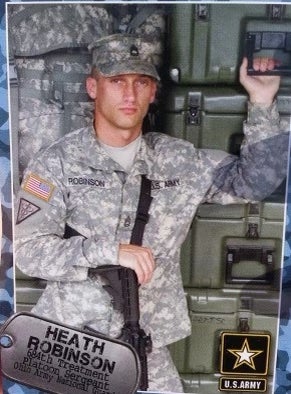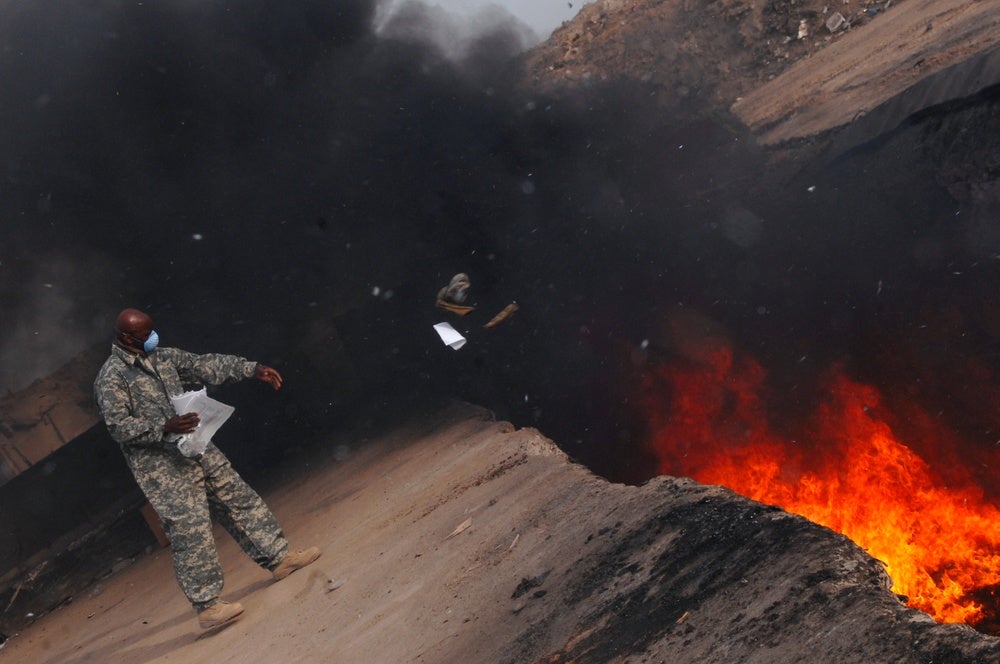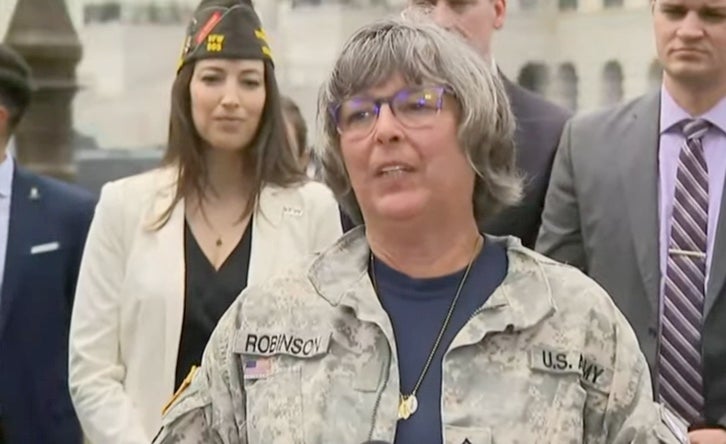Senate passes landmark burn pits bill giving veterans sick and dying from toxic exposure healthcare access
Veterans, their families and advocates have spent years battling for the US government to take the issue of burn pits seriously
The US Senate has passed a landmark burn pits bill that will finally give veterans who are sick and dying from toxic exposure access to the healthcare and benefits that they need – after more than a decade of fighting.
Senators voted 84 to 14 in favour of passing the SFC Heath Robinson Honoring our PACT Act on Thursday, sending it back to the House for another final vote before it lands on the president’s desk.
Veterans, their families and advocates celebrated its passage at an emotional press conference on Capitol Hill after spending years battling for the US government to take the issue of burn pits seriously, losing many service men and women to rare cancers, respiratory conditions and toxic brain injuries amid the wait.
Susan Zeier, mother-in-law of the bill’s namesake – the late Sgt First Class Heath Robinson, said that the bill’s passage means she now no longer needs to “carry Heath on my shoulders”.
Ms Zeier gave an emotional speech where she told how she has been wearing her son-in-law’s army jacket for the past four years to draw attention to the plight of veterans fighting for healthcare and disability access as she and other advocates lobbied the US government.
“I’ve been wearing this since the summer of 2018 and today, with this bill passing the Senate, I think it’s time to retire it,” she said.
“I no longer have to carry Heath on my shoulders while I’m advocating for all the other veterans who are out there sick and dying.”
The bill was renamed in March after the late sergeant who died in May 2020 from a rare cancer caused by breathing in toxic fumes from burn pits while serving in Iraq in the Ohio National Guard. He was 39.
Two years on from his death, the bill passed on his daughter Brielle’s ninth birthday.
Ms Zeier described her son-in-law as a “wonderful father” who was “always helpful and always generous” and fought his cancer “valiantly” to “survive as long as he could for his daughter”.
Jon Stewart, who has advocated for the passage of the bill, shared a heartwrenching moment with Ms Zeier during the press conference.
The TV host and the veteran’s mother-in-law both choked back tears as he described her as the “epitome of grace” for fighting for the cause knowing that it was too late to save her late son-in-law.
“Your tenacity personified and the way you carried the banner for your family and your loved ones and in their pain,” he said, pausing to compose himself.
“Advocating for a cause is a very lovely thing to do but to do that in your grief when you know that it’s not going to help your loved one... but that’s not what matters to you. It’s that no one goes through what you went through and that’s just the epitome of grace,” he said, before hugging Ms Zeier.

Sgt Robinson’s widow Danielle Robinson told The Independent back in March that it was “bittersweet” for her husband to be honoured with the renamed bill.
“It’s an honour to him and his memory is going to live on through it but at the same time I’d rather have him alive with us,” she said.
“I can’t help but think of all the other widows who are deserving of having their loved ones named on the PACT Act.
“It’s not just about our story but all of the other widows out there fighting the battle and losing their loved ones because of toxic exposure to burn pits and it’s about all the current veterans trying to fight for the healthcare they deserve.”
In Thursday’s press conference, several other veterans, advocates and lawmakers also celebrated the bill’s passing, calling it a “monumental day”.
Jen Birch, a US veteran and IAVA representative, told American service men and women that they can now “take a deep breathe” on what marks a “monumental day”.
“Lives will be saved, children will have their parents around to watch them grow up,” she said.
“If you are a veteran now watching this: take a deep breath. Help is on the way.”
She added: “Whether you get sick or whether you die, your family will be taken care of. Help is on the way.”
Le Roy Torres, an Iraq veteran now battling constrictive bronchiolitis caused by toxic exposure to burn pits, thanked everyone for the “monumental effort” to get the bill passed and paid tribute to his wife Rosie Torres for leading the fight in the “war that followed us home”.
“She made a promise to me in 2010 when they took me into the operating room,” he said.
“She said we’re going to fight for this.”
Mr and Ms Torres cofounded BurnPits360 and have spent the last decade pushing Congress to pass legislation like the PACT Act.
Mr Torres had transitioned from active duty to an Army reserve and was working as a Texas state trooper for the Texas Department of Public Safety (TDPS) when he was deployed to Iraq in 2007.
He began suffering respiratory issues while on deployment and was hospitalised within a matter of weeks of returning home to the US at the end of his tour.

He was finally diagnosed with constrictive bronchiolitis and has spent a decade fighting for the VA to recognise his illness as service-connected.
John Feal, a 9/11 first responder who first lobbied the government to give survivors at Ground Zero access to healthcare and then lobbied for veterans suffering from burn pits alongside Mr Stewart, said there is still “work ahead” to ensure the legislation translates into action.
“The advocacy starts when the president signs this bill,” he said.
While the bill’s passage was a cause for celebration, Mr Feal said he was “sad for the families who lost their loved ones before this legislation took effect”.
While the PACT Act reached 24 more than the 60 votes needed to pass the Senate, 14 Republicans voted against supporting around 3.5m US veterans who risked their lives serving their country.
The senators voting no were: Senators Burr, Crapo, Lankford, Lee, Lummis, Paul, Risch, Romney, Rounds, Shelby, Thune, Tillis, Toomey, and Tuberville.
Senators Daines and Wicker were absent from the vote.
The bill will now head back to the House for a vote before it can be sent to President Joe Biden to be signed into law.
However, passage in the House is almost certain as all Democrats and 34 Republicans voted in favour of its passage back in March, sending it sailing over the threshold with a 256 to 174 vote.
Last month, senators then reached a bipartisan deal on the bill, modifying the House version to create a phase-in period for illnesses presumptively linked to toxic exposure.

Despite this agreement reached between Senators Jon Tester and Jerry Moran – the top Democrat and Republican on the Senate Veterans’ Affairs Committee – the bill had stalled in the Senate since the start of June as lawmakers put forward a series of amendments.
Now, following the bill’s passage in the Senate on Thursday, the House must now pass this new version.
Mr Biden, who believes his son Beau Biden may have died as a result of toxic exposure to burn pits, has previously urged Congress to pass legislation to support veterans impacted by burn pits and said he will sign the bill as soon as it lands on his desk.
Under the legislation, 23 cancers, respiratory illnesses and other conditions will now be presumptively linked to a veterans’ exposure to burn pits while on deployment overseas.
This means service men and women who have returned home from serving their country and developed one of these conditions will be given automatic access to healthcare and disability benefits.
It will also fund federal research on the impact of burn pits on the nation’s troops.
The legislation will cost around $180bn over the next four years.
Speaking on the Senate floor ahead of the vote on Thursday morning, Sen Moran said that “freedom is not free”.
“There’s no doubt that the cost of this is high but freedom is not free,” he said.
“There’s always a cost of war... the cost of war is not fully paid when the war is over.”
He added: “We are now on the verge of honouring our commitment [to the men and women who served the US].”
Sen Tester told his fellow lawmakers: “This bill is about righting a wrong that has been ignored for just too damn long.”
He said that the vote “makes history” and will finally end “the days of ignoring the wounds from toxic exposure”.

An estimated 3.5m servicemembers and veterans are estimated to have been exposed to burn pits and airborne toxins while serving the US overseas, according to the Veterans Affairs (VA).
During America’s post-9/11 wars in Iraq and Afghanistan, huge open-air pits were used to burn mountains of trash including food packaging, human waste and military equipment on US military bases.
Thousands of US service members returned home from deployment and developed health conditions including rare cancers, lung conditions, respiratory illnesses and toxic brain injuries caused by breathing in the toxic fumes from the pits.
But, until now, the burden of proof has always been on veterans to prove their condition is directly caused by this toxic exposure.
In September 2020, a senior VA official testified before Congress that almost 80 percent of disability claims mentioning burn pits were rejected between 2007 and 2020.
In the last six months, the president has made tackling the issue of burn pits a higher priority and repeatedly urged lawmakers in the House and Senate to pass legislation to support veterans.
During his State of the Union address in March, Mr Biden connected Beau Biden’s death to his exposure to burn pits during his deployment to Iraq.
Last week, the president signed into law a package of nine bills to improve healthcare access for US veterans, including legislation that ensures female veterans who served near burn pits have access to breast cancer screenings.
Join our commenting forum
Join thought-provoking conversations, follow other Independent readers and see their replies
Comments



Bookmark popover
Removed from bookmarks